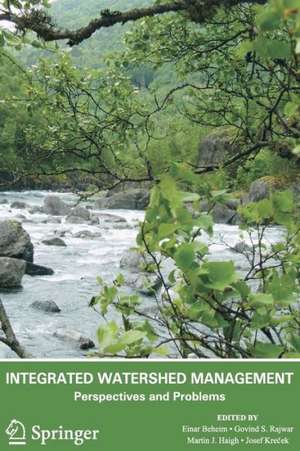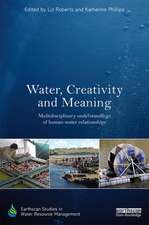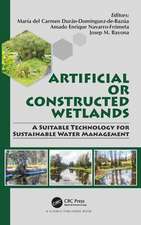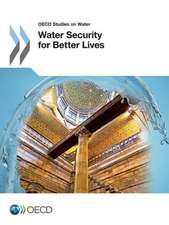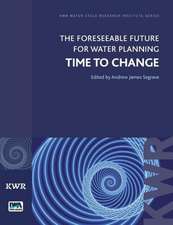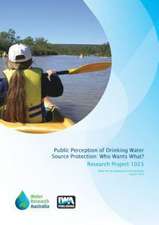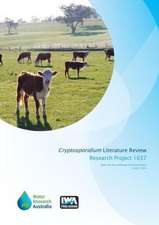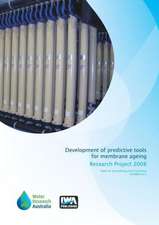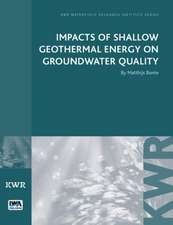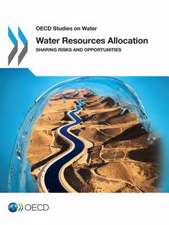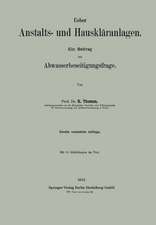Integrated Watershed Management: Perspectives and Problems
Editat de E. Beheim, G.S. Rajwar, M. Haigh, J. Kreceken Limba Engleză Paperback – 27 noi 2014
This book aims to bring about an awareness in sustainable regeneration of headwater regions and particularly highlighting the problems of environmental management in highlands and headwaters. These regions consist of great reserves of natural resources which need to be exploited and managed sustainably.
| Toate formatele și edițiile | Preț | Express |
|---|---|---|
| Paperback (1) | 640.37 lei 43-57 zile | |
| SPRINGER NETHERLANDS – 27 noi 2014 | 640.37 lei 43-57 zile | |
| Hardback (1) | 649.06 lei 22-36 zile | |
| SPRINGER NETHERLANDS – 29 iun 2010 | 649.06 lei 22-36 zile |
Preț: 640.37 lei
Preț vechi: 753.39 lei
-15% Nou
Puncte Express: 961
Preț estimativ în valută:
122.55€ • 127.47$ • 101.17£
122.55€ • 127.47$ • 101.17£
Carte tipărită la comandă
Livrare economică 14-28 aprilie
Preluare comenzi: 021 569.72.76
Specificații
ISBN-13: 9789400792630
ISBN-10: 9400792638
Pagini: 296
Ilustrații: XVII, 273 p.
Dimensiuni: 155 x 235 x 16 mm
Greutate: 0.42 kg
Ediția:2010
Editura: SPRINGER NETHERLANDS
Colecția Springer
Locul publicării:Dordrecht, Netherlands
ISBN-10: 9400792638
Pagini: 296
Ilustrații: XVII, 273 p.
Dimensiuni: 155 x 235 x 16 mm
Greutate: 0.42 kg
Ediția:2010
Editura: SPRINGER NETHERLANDS
Colecția Springer
Locul publicării:Dordrecht, Netherlands
Public țintă
ResearchCuprins
Sustainable Watershed Management.- Sustainable Management of Headwater Resources.- Social Science Contributions to Multiple Objective Decision Making within Watersheds.- Managing Headwater Regions in Australia: Assessing Socio-economic and Resource Sustainability.- Building Co-operations, Coalitions and Governance on Mountain Catchments Sustainability.- Developing Sustainability Priorities with a Participatory Process: Lake Victoria Basin, East Africa.- Management of Headwaters in Acidified Areas along the West Coast of Norway.- Catchment and Streamflow Hydrology.- Monitoring for Modelling Reality and Sound Economics.- The Nile Headwaters: Wetlands and Catchments in Highland Ethiopia.- Changing Flow in the Okavango Basin: Upstream Developments and Downstream Effects.- Bedrock Groundwater as a Major Control on Streamflow Generation in Upland Wales, UK.- CRENODAT (Biodiversity Assessment and Integrity Evaluation of Springs of Trentino (Italian Alps) and Long-term Ecological Research): Project Design and Preliminary Results.- Quality, Pollution and Management of Water Resources.- Water as a Symbol of National Identity in Norway.- Assessing Renewable Water Resources and Water Use in Angola.- Water Management Issues in Middle Mountain Catchments of the Nepal Himalayas: The Downstream Perspective.- Inventorisation of Environmental Risk Associated with Hazardous Waste Generated in Small Scale Industrial Area of Delhi, India.- The Impact of Land Use on Nutrient Concentration in Upper Streams of Waters in Slovenia.- Recovery of Headwater Catchments and Lakes Affected by the Acid Atmospheric Deposition.- Monitoring and Mitigation of Disasters.- Disasters in the Hindu Kush Himalayan Region: A Case Study of Tsatichhu Lake in Bhutan.- Perception and Communication of Flood Risk: Preliminary Results from the FLOWS Project.- Decreasing the Risk of Floods in Small and Medium Sized Catchments through Natural Storage in Headwater and Riparian Zones.- Estimating Sediment Mobilisation from Torrent and Gully Deposits: Field Studies.- Socio-Economic and Environmental Impacts of Erosion and Sedimentation in Sudan.
Caracteristici
High level sponsorship from IAHS, IAHC, UNESCO, UNU etc. Truly international in authorship Headwater Control – a unique movement on the interface between the physical and applied sciences of land and water management
